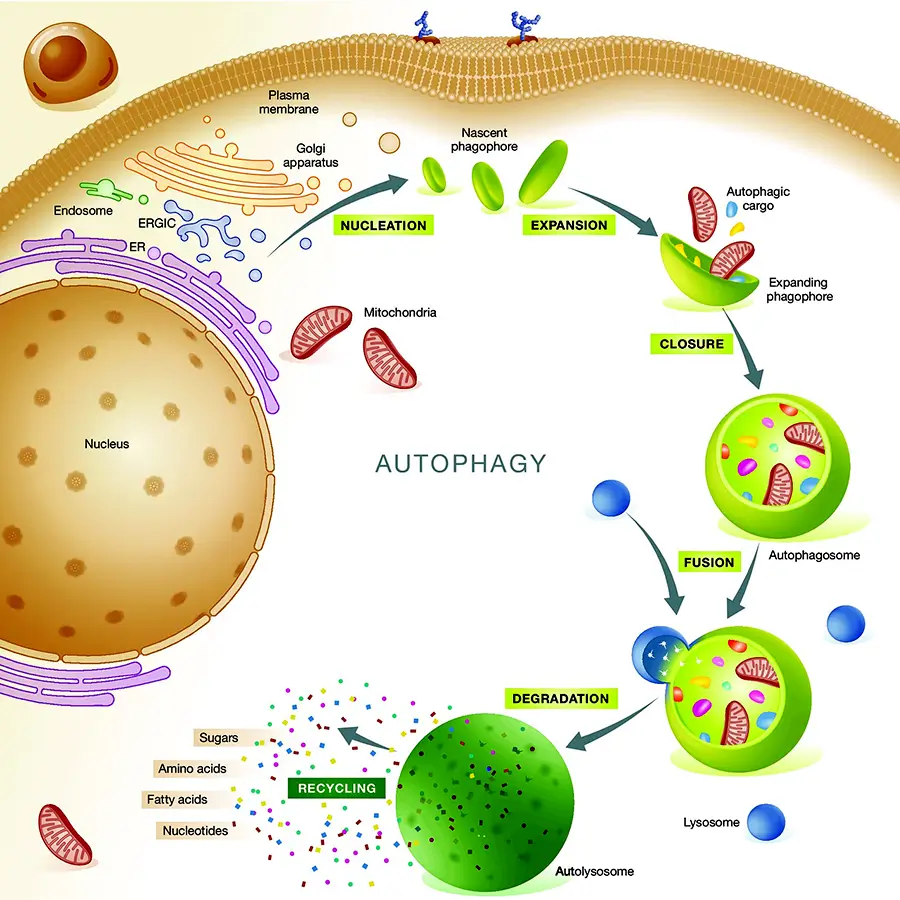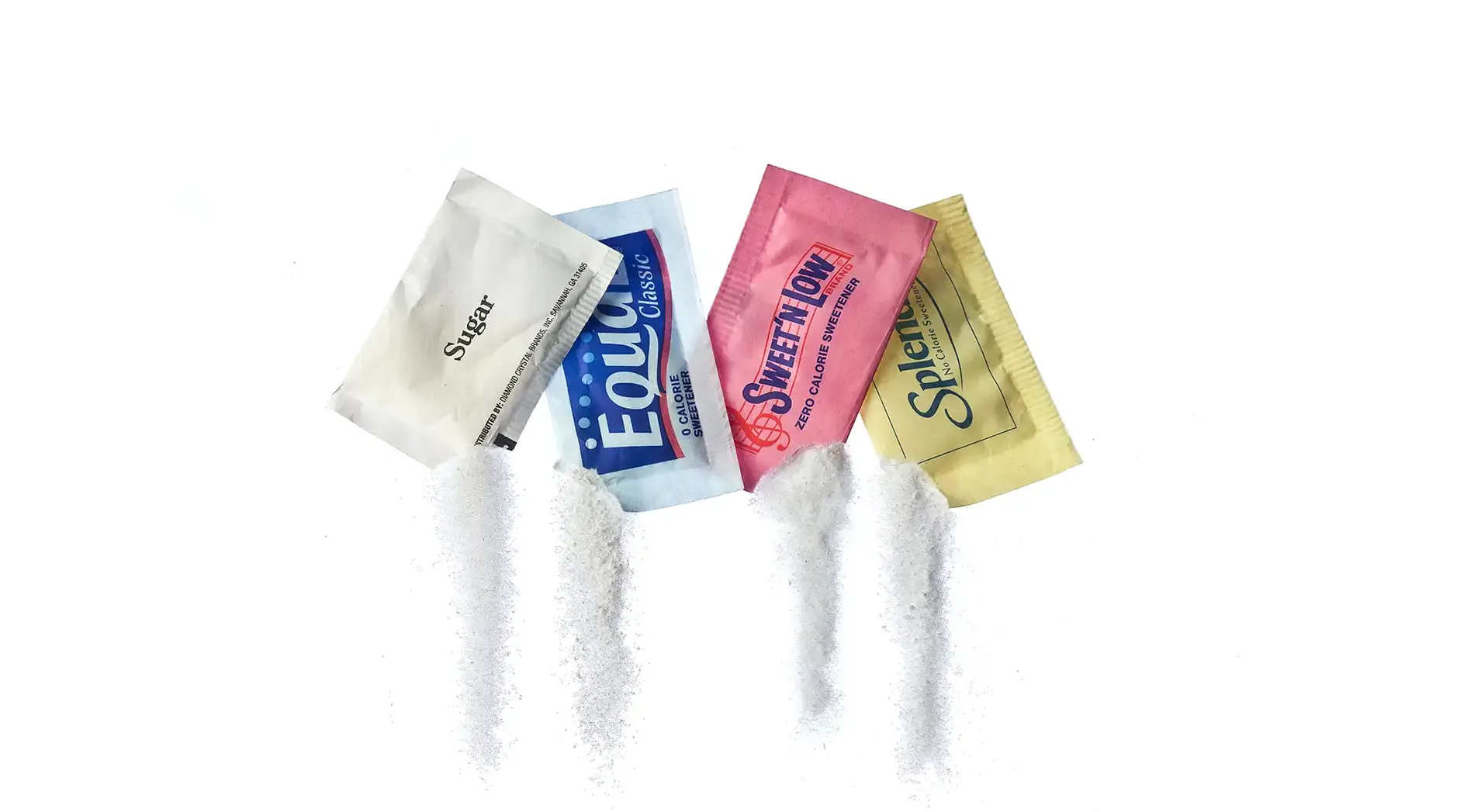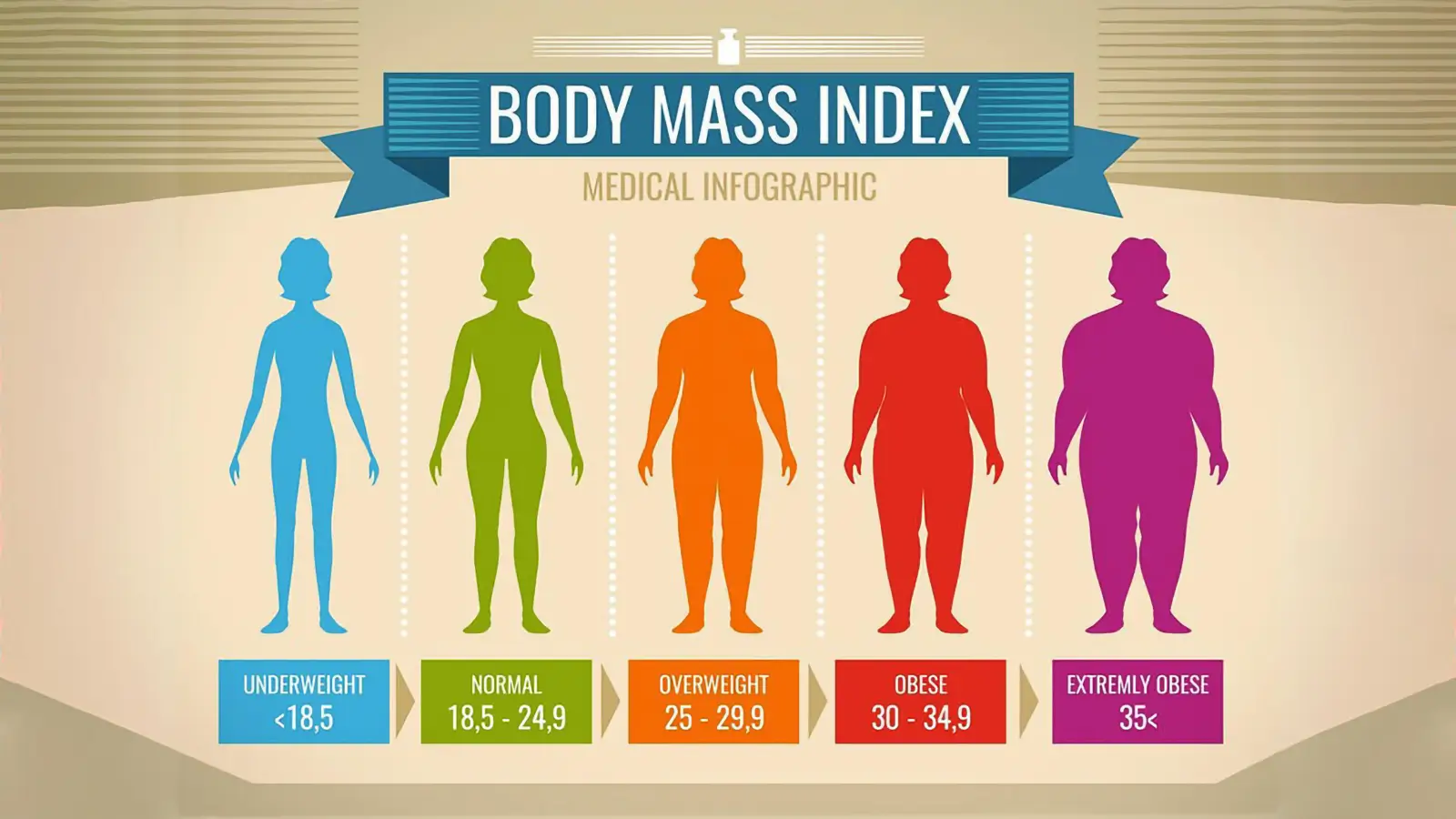How to Fast: Fasting Foods That Won’t Break Autophagy
To keep us in fasting mode the blood sugar should not get too much higher than 100 mg/dL and if it goes to 120 the autophagy is suspended. Fasting foods are limited to 20 calories per serving.
Milos Pokimica
Written By: Milos Pokimica
Medically Reviewed by: Dr. Xiùying Wáng, M.D.
Updated February 9, 2024Key Takeaways:
– One of the ways to trigger autophagy is to fast. When you fast, you deprive your body of nutrients, and your cells have to rely on their own reserves for energy.
– If you want to trigger autophagy, you need to lower your insulin, mTOR, and AMPK levels. The easiest way to do that is by fasting for 14 hours or more.
– There is no definitive answer to how many calories would break autophagy, as it may depend on several factors, such as your body weight, metabolism, activity level, and type of food or drink.
– Some experts suggest that anything more than 10 to 15 calories per hour could stop autophagy therefore fasting foods we can eat are limited to less than 20 calories per serving.
– Some average estimate is that one gram of carbohydrate can raise blood sugar by about 4 points on average. This means that to raise blood sugar by 1 point, you would need about 0.25 grams of carbohydrate, which is equivalent to about 1 calorie.
– To keep you in fasting mode the blood sugar should not get too much higher than 100 and if it goes to 120 the autophagy is suspended. Regular fasting levels of blood glucose are below 100 mg/dL. To keep autophagy we need to be below 100.
– To stay in range a safe option would be not to eat more than 20 calories in one meal.
– There are no fasting foods that can be eaten without any limits during a fast that have zero or low calories without breaking the fast or stopping autophagy. However, some fasting foods and drinks that are very low in calories or have zero calories may not have significant effects on fasting or autophagy if consumed in moderation and with caution.
– If you want to drink water kefir without breaking your fast or stopping autophagy, you may want to limit your intake to a small amount. No more than one cup in two hours.
– Beet kvass is not a zero-calorie drink, and it may break your fast or stop autophagy if you consume it during fasting in an amount of more than one cup.
– Fermented vegetables are generally low in calories. If you don’t want to break the fast keep the portion below 20 calories.
– Coffee can quickly stimulate autophagy by activating AMPK and inhibiting mTORC1.
– Coffee can maintain autophagy by keeping mTORC1 low, but not by keeping AMPK high.
– The beneficial effects of coffee might be due to the polyphenols that are present in coffee.
– Coffee can mimic caloric restriction, which is a well-known way of extending lifespan and preventing diseases, by reducing the acetylation levels of cellular proteins.
– The evidence for the effects of tea on autophagy during fasting is not very clear and there are a lot of different herbal teas available.
– Some of the teas like green tea are also believed to be able to suppress appetite during the fast.
– All of the teas however are free of calories and would not break the autophagy if consumed during the fast.
– Herbs and spices are a great way to add flavor and aroma to your dishes without adding too many calories.
– Some studies suggest that apple cider vinegar may help lower blood sugar levels and boost weight loss, both of which are common goals for people who fast (Petsiou et al., 2014) (Lim et al., 2016).
– Moreover, apple cider vinegar may help suppress your appetite and increase your feeling of fullness, which can help you eat less during your eating window (Darzi et al., 2014).
– Apple cider vinegar contains very few calories and carbs, so it won’t break your fast or kick you out of autophagy. In fact, it may even enhance ketosis by increasing the production of ketones in the liver.
Autophagy.
Have you ever wondered what happens to the cells in your body when they die or get damaged? Do they just pile up and create problems, or do they get disposed of somehow? The answer is that your body has a natural way of recycling and renewing itself, and it’s called autophagy.
Autophagy comes from the Greek words “auto” meaning self and “phagy” meaning eating. So, autophagy means self-eating. It’s a process where your cells break down and reuse their components, such as proteins and organelles. This way, your body can get rid of the old and inefficient parts, and replace them with new and functional ones.
Autophagy is essential for maintaining the balance and health of our cells. It helps to prevent the accumulation of damaged cells, which can lead to serious diseases such as cancer, diabetes, and neurodegeneration.
One of the ways to trigger autophagy is to fast. When you fast, you deprive your body of nutrients, and your cells have to rely on their own reserves for energy.
This activates autophagy, which cleans up the waste and recycles the useful materials. Fasting can also induce a type of cell death called autophagy-induced cell death, which targets the cells that are damaged or mutated beyond repair. This is different from another type of cell death called apoptosis, which is more controlled and regulated.
Fasting can have many benefits for your health, such as boosting your immune system, reducing inflammation, improving metabolism, and extending your lifespan. However, fasting also has some drawbacks, such as losing some muscle mass. When you fast, your body first uses up the glycogen stored in your liver and muscles. Then, it switches to burning fat for fuel. But it also breaks down some amino acids from your muscles to make glucose for your brain and other organs. This means that you will lose some muscle mass along with fat.

Summary:
Autophagy is your body’s natural self-eating process that recycles damaged cells and components, promoting health and longevity. Fasting is a key way to trigger this process for cleaner cells and potential health benefits like reduced inflammation and boosted immunity.
How to Trigger Autophagy.
In today’s world, food is always available, and we rarely fast for long periods. This means that we miss out on the benefits of autophagy, such as:
- Reducing inflammation and oxidative stress
- Preventing diseases like cancer, diabetes, and Alzheimer’s
- Enhancing brain function and memory
- Slowing down aging and extending lifespan
So how can we activate autophagy without starving ourselves?
The answer is simple: by fasting for 14 hours or more (Yang et al. 2017).
There are three main pathways that regulate autophagy (Alers et al., 2012):
- Insulin: This hormone responds to carbohydrates and proteins in your blood. When insulin is high, it signals that you have enough energy and stops autophagy. When insulin is low, it signals that you need to use your stored energy and starts autophagy.
- mTOR: This enzyme responds to proteins in your cells. When mTOR is high, it signals that you have enough building blocks for growth and stops autophagy. When mTOR is low, it signals that you need to recycle your old parts and starts autophagy.
- AMPK: This enzyme responds to the energy level in your cells. When AMPK is high, it signals that you have low energy and starts autophagy. When AMPK is low, it signals that you have high energy and stops autophagy.
If you want to trigger autophagy, you need to lower your insulin, mTOR, and AMPK levels. The easiest way to do that is by fasting for 14 hours or more.
When you fast, your insulin drops because you are not eating any carbohydrates or proteins. Your mTOR drops because you are not eating any proteins. And your AMPK rises because your cells are running low on energy.
These changes activate glucagon, a hormone that opposes insulin and stimulates autophagy. Glucagon tells your body to break down your stored fat and use it as fuel. This process also produces ketones, which are molecules that can cross the blood-brain barrier and provide energy for your brain.
As a result, fasting for 14 hours or more can boost your metabolism, burn fat, improve brain function, and activate autophagy.
But what if you don’t want to fast for so long? Is there a way to induce autophagy faster? Yes, there is. You can use exercise and nutrition to enhance the effects of fasting.
Exercise can increase AMPK levels by depleting glycogen or in other words the energy in your muscles. This can also lower insulin and mTOR levels by increasing glucose uptake and protein breakdown. Therefore, exercise can stimulate autophagy even if you are not fasting for a full 14 hours. However, you would have to do fasted cardio which is very hard to do for most people. If you have any level of insulin sensitivity below optimal it would also lead to hypoglycemia.
Nutrition can also influence autophagy by modulating insulin and mTOR levels. Some foods can lower insulin and mTOR levels by providing antioxidants, polyphenols, or ketones. These include green tea, coffee, and apple cider vinegar. Other foods can raise insulin and mTOR levels by providing carbohydrates or proteins. These include bread, pasta, rice, potatoes, beans, meat, dairy, eggs, and soy.
Therefore, nutrition can either enhance or inhibit autophagy depending on what you eat.

Summary:
Because food is readily available today, we miss out on autophagy’s benefits like lowered inflammation and disease risk. Fasting for 14 hours activates this process. Exercise and certain foods like green tea can also help.
Fasting Foods That Will Not Stop Autophagy.
There is no clear consensus on what exactly breaks a fast or stops autophagy.
There is no definitive answer to how many calories would break autophagy, as it may depend on several factors, such as your body weight, metabolism, activity level, and type of food or drink.
However, some experts suggest that anything more than 10 to 15 calories per hour could stop autophagy therefore fasting foods we can eat are limited to less than 20 calories per serving.
However, this also means that even a small amount of calories like cream or sugar in the coffee could break the fast and autophagy.
Therefore, if you want to maintain autophagy, it is best to avoid any foods or beverages that contain calories during your fasting period. You can drink water, black coffee, or unsweetened tea, as they have zero or very low calories and may even enhance autophagy. You can also take supplements that support autophagy, such as spermidine, which is a natural compound found in some foods.
Generally speaking, any food or drink that contains calories will break a fast and potentially interfere with autophagy. Therefore, it is best to avoid any foods or beverages that provide energy, such as:
- Sugar, honey, syrup, and other sweeteners
- Milk, cream, cheese, and other dairy products
- Meat, poultry, fish, eggs, and other animal products
- Nuts, seeds, oils, butter, and other fats
- Grains, bread, pasta, rice, and other starches
- Fruits, juices, smoothies, and other sugary drinks
- Alcohol, soda, energy drinks, and other caffeinated beverages
Some foods and drinks that are very low in calories or have zero calories may not break a fast or stop autophagy. However, some of them may still have some effects on your metabolism or hormone levels. Therefore, it is advisable to consume them in moderation and with caution. Some examples are:
- Water: The only truly zero-calorie food is water that assists in weight loss and other benefits. It keeps you hydrated during fasting with no calories to consume.
- Coffee and tea: Unsweetened black coffee and tea are very low in calories and may even boost autophagy by stimulating the production of ketones. However, adding sugar, milk, creamer, or sweetener will break a fast and stop autophagy. Also, caffeine may affect your sleep quality and cortisol levels.
- Apple cider vinegar: Diluted apple cider vinegar may have some benefits for blood sugar control and appetite suppression. However, it also contains some calories and acetic acid, which may affect your digestion and tooth enamel.
- Bone broth: Bone broth is a liquid made from simmering animal bones and connective tissue. It is rich in collagen. However, it also contains some calories and may stimulate the release of insulin.
- Gum and mints: Sugar-free gum and mints may help curb your appetite and freshen your breath during fasting. However, they also contain artificial sweeteners like xylitol or sorbitol, which may have some effects on your gut bacteria and blood sugar levels.
In summary, there are no fasting foods that can be eaten without any limits during a fast that have zero or low calories without breaking the fast or stopping autophagy. However, some fasting foods and drinks that are very low in calories or have zero calories may not have significant effects on fasting or autophagy if consumed in moderation and with caution.
Moderation means no more than 20 calories in total.
Summary:
While anything with calories technically breaks a fast and potentially hinders autophagy, some low-calorie options like black coffee might be okay in moderation (under 20 calories). Ultimately, stick to zero-calorie choices like water for guaranteed autophagy activation during your fast.
Blood Sugar Levels and Fasting.
There is no simple answer to how many calories it takes to raise blood sugar level by 1 point, as it depends on several factors, such as your body weight, metabolism, activity level, and type of food or drink.
However, some average estimate is that one gram of carbohydrate can raise blood sugar by about 4 points on average. This means that to raise blood sugar by 1 point, you would need about 0.25 grams of carbohydrate, which is equivalent to about 1 calorie.
However, this is only a rough estimate, and the actual effect of carbohydrates on blood sugar may vary from person to person and from food to food. Some factors that can influence how carbohydrates affect blood sugar are:
- The glycemic index (GI) of the food. GI is a measure of how quickly a food raises blood sugar compared to pure glucose. Foods with a high GI (such as white bread, candy, or soda) raise blood sugar faster and higher than foods with a low GI (such as whole grains, beans, or vegetables).
- The glycemic load (GL) of the food. GL is a measure of how much carbohydrate is in a serving of food and how it affects blood sugar. GL takes into account both the quantity and quality of carbohydrates in a food. Foods with a high GL (such as large portions of high-GI foods) have a greater impact on blood sugar than foods with a low GL (such as small portions of low-GI foods).
- The fiber content of the food. Fiber is a type of carbohydrate that is not digested or absorbed by the body. Fiber can slow down the digestion and absorption of other carbohydrates in the same meal, resulting in a lower and more gradual rise in blood sugar. Foods that are high in fiber (such as fruits, vegetables, nuts, and seeds) tend to have a lower GI and GL than foods that are low in fiber (such as refined grains, sweets, and juices).
- The physical activity level. Physical activity can lower blood sugar by increasing the use of glucose by the muscles and improving insulin sensitivity. However, the effect of exercise on blood sugar depends on the type, intensity, duration, and timing of the activity. Exercise before or after a meal can also affect how the meal influences blood sugar.
To keep you in fasting mode the blood sugar should not get too much higher than 100 and if it goes to 120 the autophagy is suspended. Regular fasting levels of blood glucose are below 100 mg/dL. To keep autophagy we need to be below 100.
| Fasting | 2 hours after a meal |
| 70–99 mg/dL | Less than 140 mg/dL |
For example, to raise blood sugar from 70 to 99 mg/dL, you would need to consume about 29 calories, assuming that one gram of carbohydrate raises blood sugar by about 4 points on average. If we have an average blood fasting sugar in let’s say 75 to 85 range, 30 calories could potentially elevate our blood sugar above 100.
To stay in range a safe option would be not to eat more than 20 calories in one meal.
It also depends on the GI index of the food. We could potentially eat a meal with more than 30 calories if the meal has a lot of fiber and no free sugars.
However, this is only a rough estimate, and the actual effect of calories on blood sugar may vary depending on several factors, such as your body weight, metabolism, activity level, and type of food or drink.
Summary:
While one calorie can raise blood sugar by roughly one point, individual responses vary based on metabolism, food type, and GI. To stay in fasting mode (blood sugar below 100), avoid exceeding 20 calories per “meal” during your fast. Opt for high-fiber, low-sugar choices to potentially increase your calorie limit.
Water Kefir.
The lowest-calorie vegetable juices are celery juice and tomato juice, with only 42 and 41 calories per cup, respectively. These juices are also rich in vitamins, minerals, and antioxidants that can benefit your health. However, it is still too many calories if we don’t want to break the autophagy and fast.
This means that any vegetable juice is forbidden during the fast. Also, you should be aware that some vegetable juices may contain added sugar, salt, or preservatives that can increase their calorie content and reduce their nutritional value.
We need vegetable juice without sugar. And we can find the answer in fermentation.
Water kefir is a fermented drink made with water kefir grains, which are a symbiotic culture of bacteria and yeast. Water kefir grains feed on sugar, which is usually added to the water along with some dried fruits. Water kefir is a probiotic beverage that can benefit your gut health and immune system, it has the full spectrum of antioxidants, minerals, and vitamins that were present in the juice before fermentation but with low calories. Most of the sugar would be fermented by the bacteria culture.
Probiotic culture is beneficial for gut health and the immune system, but live culture also consumes some of the sugar in the water kefir during the fermentation process. However, they do not eat all of the sugar, and some fructose remains in the finished drink usually a couple of grams per cup.
Therefore, water kefir is not a zero-calorie drink, and it may break your fast or stop autophagy if you consume it excessively during fasting. The amount of sugar in water kefir depends on several factors, such as fermentation time and temperature, and the type and amount of flavoring. On average, water kefir contains about 2 to 5 grams of sugar per cup, which is much lower than soda or juice, but still enough to provide some calories to elevate blood sugar above 100 if we drink too much of it.
If you want to drink water kefir without breaking your fast or stopping autophagy, you may want to limit your intake to a small amount. No more than one cup in two hours.
You may also want to avoid adding any sweeteners or fruit juices to your water kefir, as they will increase the sugar content. You can still enjoy the fizzy and tangy taste of water kefir by adding some herbs, spices, or low-sugar fruits (such as berries or citrus) during the second fermentation. Also, ferment the kefir to the end to decrease the sugar content as much as possible.
Therefore, the calorie count of water kefir can vary from batch to batch and from recipe to recipe. You can use a nutrition calculator or a food scale to estimate the calories of your water kefir based on the ingredients you use. You can also adjust the sugar amount, fermentation time, and flavoring to suit your taste and preference.

Summary:
While vegetable juices are packed with nutrients, their calorie content makes them off-limits during autophagy-focused fasts. Water kefir, a fermented drink with gut-friendly bacteria, emerges as a lower-calorie alternative. However, its remaining sugar (2-5g per cup) requires moderation: stick to no more than a cup every two hours to avoid breaking your fast and hindering autophagy.
Beet Kvas.
Beet kvass is a fermented drink made from beets, salt, and water. It is rich in probiotics, vitamins, minerals, antioxidants, and phytonutrients. Here are some nutrition facts for beet kvass:
- A 6-ounce (177 ml) serving of beet kvass contains about 16 to 72 calories, depending on the amount of sugar and flavoring added.
- Beet kvass contains about 2 grams of dietary fiber, 1 gram of protein, and 6 grams of carbohydrates per 6-ounce serving.
- Beet kvass is a good source of B vitamins (including folate) and vitamin C, which are essential for energy production, immune function, and collagen synthesis.
- Beet kvass also provides minerals such as iron, calcium, magnesium, potassium, and manganese, which are important for blood formation, bone health, muscle function, nerve transmission, and antioxidant defense.
- Beet kvass contains probiotics and food enzymes, which are beneficial for gut health, digestion, and immunity. Probiotics are live microorganisms that can restore the natural balance of gut bacteria and prevent or treat various gastrointestinal disorders. Food enzymes are substances that help break down food and enhance nutrient absorption.
- Beet kvass is rich in antioxidants and phytonutrients such as betalain, which is a pigment that gives beets their red color. Betalain has anti-inflammatory, anti-cancer, and detoxifying properties. It can also help lower blood pressure, improve blood flow, and protect the liver.
The calorie count of beet kvass without any added sugar or flavors is not easy to determine, as it may vary depending on the fermentation time and temperature.
However, a rough estimate is that a 6-ounce (177 ml) serving of plain beet kvass contains about 16 calories. This is much lower than most fruit juices or sodas, which can have over 100 calories per serving.
However, it is still not a zero-calorie drink, and it may break your fast or stop autophagy if you consume it during fasting in an amount of more than one cup.
Watch the video below to learn how to make homemade water kefir probiotic beet juice soda, which contains higher levels of antioxidants and probiotics than fresh beet juice and is low on calories.
Summary:
Beet kvass, a fermented beet drink, boasts impressive health benefits like gut health support, antioxidant power, and rich vitamin and mineral content. While its calorie count varies based on fermentation and additives, plain beet kvass packs a mere 16 calories per 6-ounce serving, making it a potentially low-calorie alternative to sugary drinks during fasts (stick to one cup max).
Fermented Vegetables.
Some vegetables that are low in sugar are cucumbers, celery, lettuce, spinach, kale, and broccoli.
If we ferment these vegetables the result would be the same as with water kefir fermentation. Lower calorie end product that has the potential not to break our fast if we consume a small amount.
The calorie of fermented vegetables depends on the type and amount of ingredients used, as well as the fermentation time and temperature. Here are some approximate values for a 100-gram (3.5-ounce) serving of some common fermented vegetables based on the assumption that fermentation reduces the carbohydrate content by about 10%:
- Sauerkraut: 19 calories
- Kimchi: 22 calories
- Fermented cucumbers: 11 calories
- Fermented celery: 14 calories
- Fermented lettuce: 12 calories
- Fermented spinach: 18 calories
- Fermented kale: 25 calories
- Fermented broccoli: 23 calories
As you can see, fermented vegetables are generally low in calories. If you don’t want to break the fast keep the portion below 20 calories.
Also, there is a difference between pickled vegetables for example pickled cucumbers and fermented vegetables. Pickled vegetables are vegetables that have been preserved in a hot vinegar solution, which kills any microorganisms and enzymes on the food and does not lower the calorie count. Fermented vegetables are vegetables that have been salted and left at room temperature, which allows beneficial bacteria and yeast to grow by eating sugar and producing lactic acid. The lactic acid preserves the vegetables and also enhances their flavor and nutrition.
Summary:
While low-sugar veggies like cucumber and celery shine in fermented form, their calorie count still matters during fasts. Stick to portions below 20 calories (think a few bites) and remember, pickled veggies are different and don’t offer the same low-calorie advantage.
Coffee.
A cup of regular black coffee brewed from ground beans has only about 2 calories. That’s almost nothing compared to other drinks. A cup of black espresso has even less, just 1 calorie. That’s because espresso is made with less water and more finely ground beans.
Sugar and cream will increase the calorie count of your coffee, depending on how much you use. For example, one teaspoon of sugar has about 16 calories, and one tablespoon of half-and-half has about 20 calories. So if you add one teaspoon of sugar and one tablespoon of half-and-half to your coffee, you’ll end up with about 38 calories in your cup.
Of course, calories are not the only thing to consider when drinking coffee. Coffee also contains caffeine, which is a stimulant that can affect your sleep quality and cortisol levels. Cortisol is a hormone that regulates your stress response and metabolism. Too much caffeine can increase your cortisol levels and make you feel anxious, jittery, or restless. It can also interfere with your sleep cycle and make it harder for you to fall asleep or stay asleep. Therefore, it is advisable to limit your intake of coffee and drink it only in moderation.
How does it activate the process of autophagy?
A recent study explored these questions by looking at the effects of coffee on the energy sensors and protein acetylation levels in mice (Pietrocola et al., 2014). The researchers gave the mice different doses of coffee, either with or without caffeine, and measured the activity of two important energy sensors: AMPK and mTORC1. AMPK is a protein that senses low energy levels and stimulates autophagy. mTORC1 is a protein complex that senses high nutrient levels and inhibits autophagy. The researchers also measured the acetylation levels of cellular proteins, which can affect their function and stability.
The researchers found that coffee can affect both energy sensors and protein acetylation in different ways, depending on the duration and dose of coffee administration. When they gave the mice coffee, they saw a short-term increase in AMPK activity and a decrease in mTORC1 activity in all organs within one to four hours. This was true for both caffeinated and decaffeinated coffee.
This means that coffee can quickly stimulate autophagy by activating AMPK and inhibiting mTORC1.
However, when they gave the mice coffee in their drinking water for 16 days, they saw a long-term decrease in AMPK activity and a sustained decrease in mTORC1 activity in all organs. This was true for both 1% and 3% coffee, but not for 10% caffeinated coffee, which caused weight loss in the mice.
This means that coffee can maintain autophagy by keeping mTORC1 low, but not by keeping AMPK high.
The researchers also found that coffee can reduce the acetylation levels of cellular proteins in all organs within one to four hours after gavage. This was true for both caffeinated and decaffeinated coffee. They found that coffee reduced protein acetylation both in the cytoplasm and in the nuclei of liver, heart, and muscle cells.
The researchers speculated that the beneficial effects of coffee might be due to the polyphenols that are present in coffee.
Polyphenols are natural compounds that have antioxidant and anti-inflammatory properties. They might also stimulate autophagy by interacting with cellular receptors or signaling pathways.
In summary, this study showed that coffee can induce autophagy in mice by different doses and routes of administration and that this effect does not depend on caffeine content. This suggests that coffee might have a positive impact on your health by activating this natural self-cleaning mechanism in your cells.
It also showed that coffee can mimic caloric restriction, which is a well-known way of extending lifespan and preventing diseases, by reducing the acetylation levels of cellular proteins.
Summary:
Surprisingly, black coffee (around 2 calories per cup) can boost autophagy, your body’s cellular clean-up process, without breaking your fast. It works by activating AMPK and inhibiting mTORC1, both key players in autophagy. Enjoy it black for maximum benefit and consider its potential impact on sleep and cortisol levels.
Tea.
Tea is a zero-calorie beverage that can hydrate your body during a fast. Tea also contains polyphenols, which are natural compounds that have antioxidant and anti-inflammatory properties. Some studies have suggested that polyphenols can stimulate autophagy.
However, the evidence for the effects of tea on autophagy during fasting is not very clear and there are a lot of different herbal teas available.
Some of the teas like green tea are also believed to be able to suppress appetite during the fast.
A recent systematic review tried to answer these questions by examining the evidence from 32 studies that tested the effects of different bioactive phytochemicals on appetite and satiety (Stuby et al., 2019). The studies involved adults who were overweight or obese, but otherwise healthy. The review focused on the most commonly used plants, such as green tea, red pepper, and coffee.
The results were not very convincing. The review found that none of the plants tested in several trials showed a consistent positive effect on appetite or satiety. In other words, there was no clear evidence that any of the bioactive phytochemicals could help people eat less or feel more satisfied including green tea and coffee. Moreover, the review found that only a few side effects were reported, but none serious. This means that the bioactive phytochemicals were generally safe to use, but not very effective.
The review also explained the possible mechanisms of action of these natural remedies. They may act on different targets in your body, such as hormones in your gut (such as GLP-1 or ghrelin) or receptors in your nervous system (such as TRPV1). These targets may affect your hunger and fullness signals. However, the exact mechanisms are still not fully understood.
The review concluded that the current evidence for the use of bioactive phytochemicals as appetite suppressants or satiety enhancers is mostly inconclusive.
More systematic and high-quality studies are needed to determine the benefits and safety of these natural remedies for weight loss. Also, the quality and composition of these food supplements may vary widely, since they are not regulated as strictly as pharmaceutical drugs. They may also interact with other medications and cause adverse events.
To conclude it is unlikely that green tea would significantly suppress appetite during fast but this does not mean that green tea and other herbal teas do not have other potent health benefits. The health benefits of herbal medicine are outside of the scope of this article and if you want to drink tea during the fast you should research the health benefits of every plant that you want to consume.
All of the teas however are free of calories and would not break the autophagy if consumed during the fast.
Summary:
While black coffee might offer a surprising autophagy boost, green tea’s appetite suppression claims remain inconclusive. Enjoy tea’s zero-calorie hydration during your fast, and remember, all herbal teas are zero-calorie and won’t break your fast.
Dried Herbs and Spices.
Herbs and spices are a great way to add flavor and aroma to your dishes without adding too many calories. However, some herbs and spices may have more calories than others, depending on their type and amount.
Salt: Salt has zero calories, as it is a mineral that does not provide any energy to the body. However, salt is also high in sodium, which can raise blood pressure and cause other health problems if consumed in excess.
Basil: Basil is a green herb that belongs to the mint family. It has 23 calories per 100 grams, and it can add a fresh and aromatic flavor to your soups, salads, pasta, and pizza. Basil also contains vitamins A, C, K, and B6, as well as minerals such as iron, calcium, magnesium, and manganese.
Chili flakes and black pepper are both low-calorie spices that can add heat and flavor to your dishes. Chili flakes are crushed red pepper flakes that have about 6 calories per teaspoon, while black pepper has about 5 calories per teaspoon.
| Spice or Herb | Calories per teaspoon |
| Salt | 0 |
| Distilled vinegar | 1 |
| Red wine vinegar | 1 |
| Apple cider vinegar | 1 |
| Basil | 1 |
| Cress | 1 |
| Chives | 1 |
| Cilantro | 1 |
| Dill / Dill weed | 1 |
| Garlic salt | 1 |
| Black pepper | 5 |
| Chili flakes | 6 |
| Oregano | 6 |
| Parsley | 6 |
| Cumin, ground | 8 |
| Paprika | 8 |
| Chile powder | 8 |
| Thyme, dried | 9 |
| Rosemary, dried | 9 |
| Sage, dried | 9 |
As you can see, most spices and herbs have less than 10 calories per teaspoon, and some have zero calories. You can use them to season your food without adding too many calories to your diet. However, you should also be careful about the sodium content of some spices, such as salt and garlic salt, as they can raise your blood pressure and cause other health problems if consumed in excess. You should also be aware of the potential interactions of some spices and herbs with certain medications or medical conditions. Therefore, it is advisable to consult your doctor or a dietitian before using any spices or herbs for health purposes.
Summary:
Most herbs and spices boast less than 10 calories per teaspoon, with salt and distilled vinegar offering calorie-free options. Just mind the sodium in some and consult a doctor before using them for health purposes.
Apple Cider Vinegar.
Apple cider vinegar is a versatile ingredient that can add flavor to dishes and provide some health benefits.
Apple cider vinegar is a fermented liquid made from crushed apples. It contains acetic acid, which is the main active ingredient that gives it its sour taste and health benefits.
Some studies suggest that apple cider vinegar may help lower blood sugar levels and boost weight loss, both of which are common goals for people who fast (Petsiou et al., 2014) (Lim et al., 2016).
Moreover, apple cider vinegar may help suppress your appetite and increase your feeling of fullness, which can help you eat less during your eating window (Darzi et al., 2014).
But the best part is that apple cider vinegar contains very few calories and carbs, so it won’t break your fast or kick you out of autophagy. In fact, it may even enhance your ketosis by increasing the production of ketones in your liver.
However, before you start chugging apple cider vinegar, there are some things you need to know. Here are some tips on how to take apple cider vinegar safely and effectively while fasting.
- Don’t take too much. While some benefits have been observed with doses as high as 2 tablespoons (30 mL) per day, this amount may also cause some unpleasant side effects, such as tooth enamel erosion and digestive irritation (Anderson et al., 2021). A more moderate dose of 1–2 tablespoons (15–30 mL) per day should be enough to reap some of the benefits without risking your health.
- Take it in capsules if you don’t like the taste. If you find the taste of apple cider vinegar too sour or unpleasant, you can opt for capsules instead. These contain dehydrated vinegar that can deliver the same benefits without the acidic flavor. Just make sure to follow the dosage instructions on the label and avoid products that contain added ingredients that may break your fast.
- Avoid gummies and drinks. While apple cider vinegar gummies and drinks may seem like a convenient and tasty way to get your dose of vinegar, they are not suitable for fasting. These products often contain added sugar and calories that can interfere with your fast and kick you out of ketosis. Stick to plain apple cider vinegar or capsules instead.
- Dilute it with water. Never drink apple cider vinegar straight, as this can damage your teeth and irritate your throat and stomach. Always dilute it with water before drinking it. A good ratio is 1 tablespoon (15 mL) of vinegar per 8 ounces (240 mL) of water. You can also add more water if you find it too strong.
- Use a straw. To protect your teeth even more from the acidity of apple cider vinegar, drink it with a straw. This will help reduce the contact between the vinegar and your enamel, which can prevent erosion and sensitivity. After drinking apple cider vinegar, rinse your mouth with water and wait at least 30 minutes before brushing your teeth.
Apple cider vinegar is a natural and beneficial addition to your fasting routine. It may help lower your blood sugar levels, boost your weight loss, and enhance your ketosis. However, make sure to take it in moderation, dilute it with water, use a straw, and avoid gummies and drinks that contain added sugar and calories. By following these tips, you can enjoy the benefits of apple cider vinegar without breaking your fast or harming your health.
Summary:
Apple cider vinegar’s low calorie count and potential benefits like appetite suppression and ketosis enhancement make it a promising addition to your fast but remember to dilute it, use a straw, and avoid gummies or drinks with added sugars to keep it fast-friendly.
FAQ
References:
- Yang, J. S., Lu, C. C., Kuo, S. C., Hsu, Y. M., Tsai, S. C., Chen, S. Y., Chen, Y. T., Lin, Y. J., Huang, Y. C., Chen, C. J., Lin, W. D., Liao, W. L., Lin, W. Y., Liu, Y. H., Sheu, J. C., & Tsai, F. J. (2017). Autophagy and its link to type II diabetes mellitus. BioMedicine, 7(2), 8. https://doi.org/10.1051/bmdcn/2017070201
- Alers, S., Löffler, A. S., Wesselborg, S., & Stork, B. (2012). Role of AMPK-mTOR-Ulk1/2 in the regulation of autophagy: cross talk, shortcuts, and feedbacks. Molecular and cellular biology, 32(1), 2–11. https://doi.org/10.1128/MCB.06159-11
- Pietrocola, F., Malik, S. A., Mariño, G., Vacchelli, E., Senovilla, L., Chaba, K., Niso-Santano, M., Maiuri, M. C., Madeo, F., & Kroemer, G. (2014). Coffee induces autophagy in vivo. Cell cycle (Georgetown, Tex.), 13(12), 1987–1994. https://doi.org/10.4161/cc.28929
- Stuby, J., Gravestock, I., Wolfram, E., Pichierri, G., Steurer, J., & Burgstaller, J. M. (2019). Appetite-Suppressing and Satiety-Increasing Bioactive Phytochemicals: A Systematic Review. Nutrients, 11(9), 2238. https://doi.org/10.3390/nu11092238
- Petsiou, E. I., Mitrou, P. I., Raptis, S. A., & Dimitriadis, G. D. (2014). Effect and mechanisms of action of vinegar on glucose metabolism, lipid profile, and body weight. Nutrition reviews, 72(10), 651–661. https://doi.org/10.1111/nure.12125
- Lim, J., Henry, C. J., & Haldar, S. (2016). Vinegar as a functional ingredient to improve postprandial glycemic control-human intervention findings and molecular mechanisms. Molecular nutrition & food research, 60(8), 1837–1849. https://doi.org/10.1002/mnfr.201600121
- Darzi, J., Frost, G. S., Montaser, R., Yap, J., & Robertson, M. D. (2014). Influence of the tolerability of vinegar as an oral source of short-chain fatty acids on appetite control and food intake. International journal of obesity (2005), 38(5), 675–681. https://doi.org/10.1038/ijo.2013.157
- Anderson, S., Gonzalez, L. A., Jasbi, P., & Johnston, C. S. (2021). Evidence That Daily Vinegar Ingestion May Contribute to Erosive Tooth Wear in Adults. Journal of medicinal food, 24(8), 894–896. https://doi.org/10.1089/jmf.2020.0108
Related Posts
Do you have any questions about nutrition and health?
I would love to hear from you and answer them in my next post. I appreciate your input and opinion and I look forward to hearing from you soon. I also invite you to follow us on Facebook, Instagram, and Pinterest for more diet, nutrition, and health content. You can leave a comment there and connect with other health enthusiasts, share your tips and experiences, and get support and encouragement from our team and community.
I hope that this post was informative and enjoyable for you and that you are prepared to apply the insights you learned. If you found this post helpful, please share it with your friends and family who might also benefit from it. You never know who might need some guidance and support on their health journey.
– You Might Also Like –

Learn About Nutrition
Milos Pokimica is a doctor of natural medicine, clinical nutritionist, medical health and nutrition writer, and nutritional science advisor. Author of the book series Go Vegan? Review of Science, he also operates the natural health website GoVeganWay.com
Medical Disclaimer
GoVeganWay.com brings you reviews of the latest nutrition and health-related research. The information provided represents the personal opinion of the author and is not intended nor implied to be a substitute for professional medical advice, diagnosis, or treatment. The information provided is for informational purposes only and is not intended to serve as a substitute for the consultation, diagnosis, and/or medical treatment of a qualified physician or healthcare provider.NEVER DISREGARD PROFESSIONAL MEDICAL ADVICE OR DELAY SEEKING MEDICAL TREATMENT BECAUSE OF SOMETHING YOU HAVE READ ON OR ACCESSED THROUGH GoVeganWay.com
NEVER APPLY ANY LIFESTYLE CHANGES OR ANY CHANGES AT ALL AS A CONSEQUENCE OF SOMETHING YOU HAVE READ IN GoVeganWay.com BEFORE CONSULTING LICENCED MEDICAL PRACTITIONER.
In the event of a medical emergency, call a doctor or 911 immediately. GoVeganWay.com does not recommend or endorse any specific groups, organizations, tests, physicians, products, procedures, opinions, or other information that may be mentioned inside.
Editor Picks –
Milos Pokimica is a doctor of natural medicine, clinical nutritionist, medical health and nutrition writer, and nutritional science advisor. Author of the book series Go Vegan? Review of Science, he also operates the natural health website GoVeganWay.com
Latest Articles –
Plant Based News
-
Should Vegans Supplement Creatine? What You Need To Know
on June 16, 2025
-
‘I Visited London As A Vegan: Here Are My Top Restaurant Picks’
on June 16, 2025
-
Dairy-Free Golden Milk Ice Cream
on June 16, 2025
-
Oven-Roasted Squash And Tomato Dhal
on June 15, 2025
-
‘I Tried TikTok’s Viral Vegan High-Protein Breakfasts’
on June 14, 2025
-
Epic Veggie Sandwich
on June 14, 2025
-
Vegan Cinnamon Slice
on June 13, 2025
Top Health News — ScienceDaily
- CRISPR-edited stem cells reveal hidden causes of autismon June 14, 2025
A team at Kobe University has created a game-changing resource for autism research: 63 mouse embryonic stem cell lines, each carrying a genetic mutation strongly associated with the disorder. By pairing classic stem cell manipulation with precise CRISPR gene editing, they ve built a standardized platform that mirrors autism-linked genetic conditions in mice. These models not only replicate autism-related traits but also expose key dysfunctions, like the brain s inability to clean up faulty […]
- Space-laser AI maps forest carbon in minutes—a game-changer for climate scienceon June 14, 2025
A pioneering study reveals how archaeologists’ satellite tools can be repurposed to tackle climate change. By using AI and satellite LiDAR imagery from NASA and ESA, researchers have found a faster, more accurate way to map forest biomass critical for tracking carbon. This innovative fusion of space tech and machine learning could revolutionize how we manage and preserve forests in a warming world.
- Brain food fight: Rutgers maps the hidden switch that turns cravings on and offon June 14, 2025
Rutgers scientists have uncovered a tug-of-war inside the brain between hunger and satiety, revealing two newly mapped neural circuits that battle over when to eat and when to stop. These findings offer an unprecedented glimpse into how hormones and brain signals interact, with implications for fine-tuning today’s weight-loss drugs like Ozempic.
- Sugar shield restored: The breakthrough reversing brain aging and memory losson June 13, 2025
A protective sugar coating on brain blood vessels, once thought to be insignificant, turns out to play a vital role in preventing cognitive decline. Restoring this layer reversed damage and memory loss in aging brains, offering a fresh approach to treating neurodegenerative diseases.
- Invisible ID: How a single breath could reveal your health—and your identityon June 13, 2025
Scientists have discovered that your breathing pattern is as unique as a fingerprint and it may reveal more than just your identity. Using a 24-hour wearable device, researchers achieved nearly 97% accuracy in identifying people based solely on how they breathe through their nose. Even more intriguingly, these respiratory signatures correlated with traits like anxiety levels, sleep cycles, and body mass index. The findings suggest that breathing isn t just a passive process it might actively […]
- Sleep-in science: How 2 extra weekend hours can calm teen anxietyon June 13, 2025
Teens might finally have a good reason to sleep in on weekends within limits. A new study reveals that teenagers who get up to two extra hours of sleep on weekends show fewer anxiety symptoms than those who don t. But go beyond that sweet spot, and symptoms can actually increase.
- Johns Hopkins blood test detects tumor dna three years earlyon June 13, 2025
Researchers at Johns Hopkins found that fragments of tumor DNA can appear in the bloodstream up to three years before a cancer diagnosis, offering a potentially revolutionary window for early detection and treatment.
PubMed, #vegan-diet –
- Protein Intake and Protein Quality Patterns in New Zealand Vegan Diets: An Observational Analysis Using Dynamic Time Warpingon June 13, 2025
Background/Objectives: Inadequate intake of indispensable amino acids (IAAs) is a significant challenge in vegan diets. Since IAAs are not produced or stored over long durations in the human body, regular and balanced dietary protein consumption throughout the day is essential for metabolic function. The objective of this study is to investigate the variation in protein and IAA intake across 24 h among New Zealand vegans with time-series clustering, using Dynamic Time Warping (DTW). Methods:…
- Diet and nutrition in cardiovascular disease prevention: a scientific statement of the European Association of Preventive Cardiology and the Association of Cardiovascular Nursing & Allied Professions…on June 12, 2025
What we eat is a cornerstone of cardiovascular disease (CVD) prevention, but health professionals may not have a clear understanding of the current evidence-based research to underpin eating habits and recommendations. This study aims to appraise existing evidence-based research on the importance of diet on CVD risk biomarkers, specifically, the effects of dietary patterns, specific foods, and constituents including vitamins/minerals and plant-derived bioactive compounds on CVD risk. […]
- Synergistic Effects of Steam Impinged Microwave-Vacuum Blanching on the Textural Behavior of Vegan Pattieson June 11, 2025
The present study was carried out to understand the effect of the process variables of the combined microwave-vacuum-steam blanching process on the textural behavior of vegan patties. This novel blanching technique was systematically evaluated to optimize parameters, including microwave power density (3.8 W/g), steam duration (3 s), pea-to-potato mash ratio (0.252), patty thickness (0.866 cm), and microwave irradiation time (133 s). Fourier transform infrared (FTIR) spectroscopy was employed […]
- Plant-based diet and risk of osteoporosis: A systematic review and meta-analysison June 10, 2025
CONCLUSIONS: This systematic review and meta-analysis indicate that adherence to plant-based diet may be associated with an elevated risk of osteoporosis, particularly at the lumbar spine, among individuals following a vegan diet or following a plant-based diet for ≥10 y. However, the heterogeneity observed across studies highlights the need for well-designed prospective studies in future, to clarify this relationship.
- Plant-based diets for sustainability and health – but are we ignoring vital micronutrients?on June 9, 2025
Plant-based diets, with limited quantities of animal foods, are increasingly promoted for sustainability and health. In many countries, animal-source foods provide the majority of several micronutrients at a population level; in the UK, milk and dairy products contribute around one third of total calcium, vitamin B(12) and iodine intake in adults. Recommendations for a predominantly plant-based diet may have the unintended consequence of reducing intake of micronutrients, particularly in […]
Random Posts –
Featured Posts –

Latest from PubMed, #plant-based diet –
- Quantifying the Environmental Human Health Burden of Food Demand in Spain: A Life Cycle Assessment Studyby Ujué Fresán on June 15, 2025
The negative impacts of current dietary patterns in Spain on both human health and the environment are well documented. While the strong connection between environmental degradation and human health is widely recognized, no studies have evaluated how environmental disruption generated specifically by Spain’s food systems translates into health outcomes. To address this gap, this study quantifies the human health burden linked to the environmental impacts of Spain’s food demand, assessing the…
- Integrating genetics and lifestyles for precision nutrition in hypertriglyceridemia: A UK Biobank and KoGES analysisby Haeng Jeon Hur on June 14, 2025
CONCLUSION: Similar genetic variants affected high-TG risk across populations despite ethnic differences in risk allele frequencies. The identified PRS significantly interacted with plant-based diet, alcohol consumption, and smoking status in both cohorts, with additional interactions observed with vitamin D intake and glycemic index in the Korean cohort.
- Validity and reliability of the Turkish version of the chrono-med diet score (CMDS) for adult participantsby Tevfik Koçak on June 14, 2025
CONCLUSIONS: Our assessments of the CMDS, consisting of 13 items, in Türkiye demonstrate that it is a viable and reliable instrument to measure adherence to the Mediterranean diet for the adult population. The CMDS is more accurate than other Mediterranean diet scores as it questions about the amount of physical activity and grain products, which helps determine each participant’s eating patterns and general health.
- Adherence to the Planetary Health Diet and Its Association with Diet Quality and Environmental Outcomes in Croatian University Students: A Cross-Sectional Studyby Gordana Kenđel Jovanović on June 13, 2025
CONCLUSIONS: This study highlights the moderate sustainability of students’ diets, with significant associations between diet quality and environmental impacts. University settings present key opportunities for the promotion of sustainable, health-oriented eating behaviors among young adults.
- Diet in Knee Osteoarthritis-Myths and Factsby Natalia Kasprzyk on June 13, 2025
Knee osteoarthritis (OA) is a common degenerative joint disease affecting global health. Its increasing prevalence, particularly among aging populations, remains a leading cause of disability. Besides conventional pharmacological and surgical treatments, dietary interventions are promising strategies to alleviate OA symptoms and progression. Unfortunately, scientific evidence does not support many commonly used, misleading ideas about nutrition in knee OA. Recent data highlight the […]
- Dietary Interventions and Oral Nutritional Supplementation in Inflammatory Bowel Disease: Current Evidence and Future Directionsby Brigida Barberio on June 13, 2025
CONCLUSIONS: Dietary interventions and ONS represent valuable therapeutic tools in IBD management. Future research should prioritize standardized, well-powered clinical trials and personalized nutritional approaches to better define their role within integrated care pathways.















